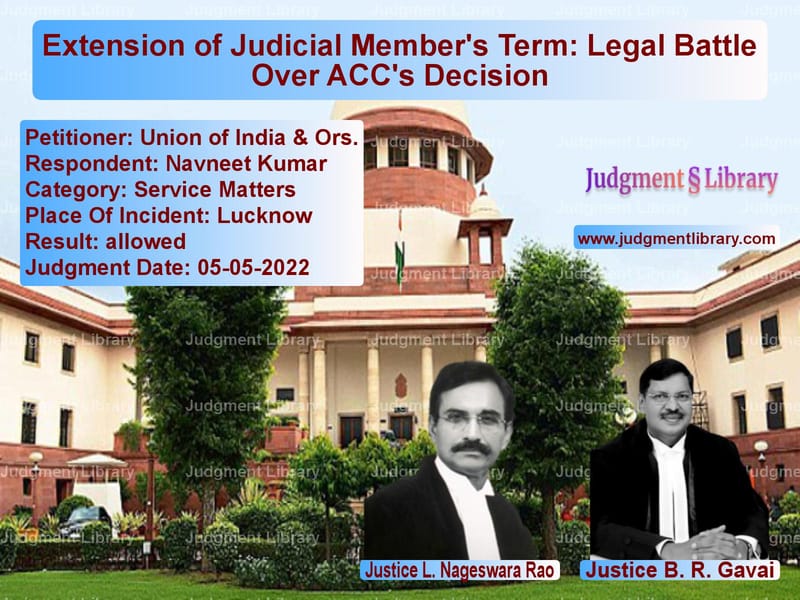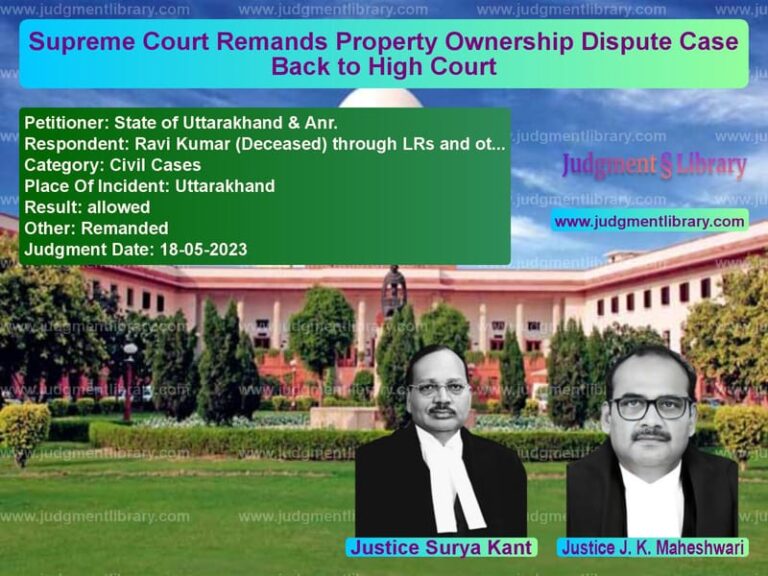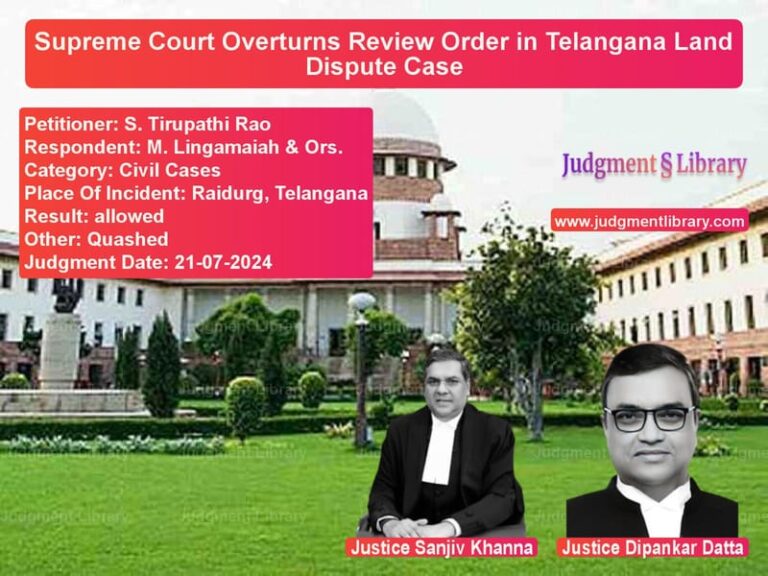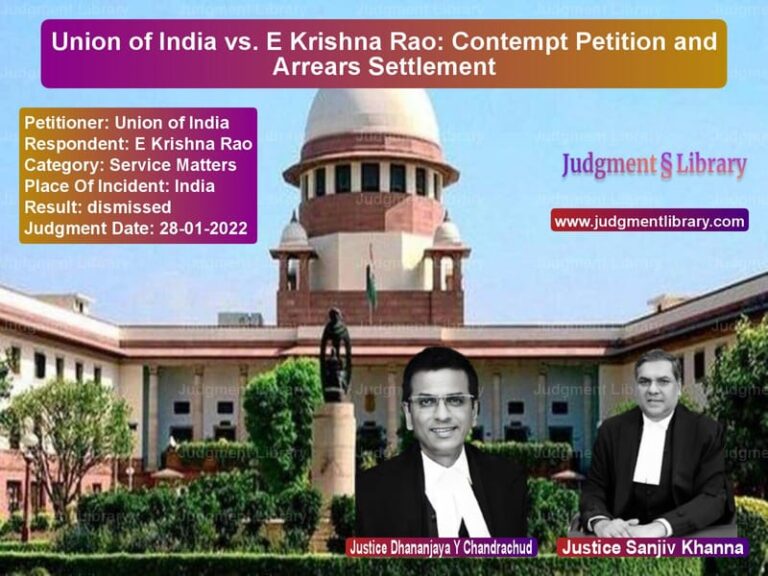Extension of Judicial Member’s Term: Legal Battle Over ACC’s Decision
This case revolves around the dispute over the extension of the respondent’s term as a Judicial Member in the Central Administrative Tribunal. The appellant, Union of India and Others, filed an appeal against the judgment passed by the High Court of Allahabad, Lucknow Bench, which had earlier allowed the writ petition filed by the respondent. The respondent, Navneet Kumar, had sought an extension of his term, which was initially rejected by the Appointments Committee of the Cabinet (ACC). The High Court’s decision has now been contested before the Supreme Court.
The respondent, Navneet Kumar, was appointed as a Judicial Member to the Central Administrative Tribunal in 2011. His term was for five years or until he turned 65, whichever came earlier. However, the respondent sought an extension of his term after it was nearing its end. The matter first came to attention when the respondent filed a writ petition against the rejection of his extension request by the ACC in 2019.
The appeal involves the interpretation of rules and procedures related to the extension of term as laid down in the Administrative Tribunals (Procedure for Appointment of Members) Rules, 2011 (2011 Rules). The main issue is whether the ACC’s decision to not extend the respondent’s term was justified, and whether the High Court was correct in directing the ACC to reconsider the matter.
Read also: https://judgmentlibrary.com/bihar-2-lecturers-merger-with-bes-supreme-court-verdict-explained/
Petitioner’s Arguments
The petitioner argued that the High Court erred in its judgment by holding that the recommendation of the Selection Committee to carry forward vacancies to the next year effectively invalidated the ACC’s decision. The appellant contended that after receiving additional material, the ACC had reconsidered the request for extension, and the decision to carry forward vacancies was made in line with procedural requirements. The petitioners stressed that the ACC’s order was in accordance with the law and did not violate any legal provisions.
Respondent’s Arguments
The respondent, Navneet Kumar, presented a strong case before the Court, arguing that the Selection Committee’s recommendation to extend his term had been valid and should be honored. The respondent highlighted the fact that there had been no adverse findings against him, and that the complaints against him had already been reviewed. He asserted that the High Court had correctly found that the proposal of the Department of Personnel and Training (DoPT) should not have been used to reject the extension of his term. The respondent emphasized that the High Court had already cleared him of the allegations in its earlier judgment and that this should have been taken into account during the decision-making process.
Judicial Analysis and Court’s Conclusion
After hearing both parties, the Supreme Court evaluated the facts and the procedural intricacies surrounding the case. The Court emphasized the importance of adhering to the recommendations made by the Selection Committee, which had approved the extension of the respondent’s term. However, the Court also considered the additional material that surfaced after the original decision and the subsequent reconsideration by the ACC. The Court found that the ACC had acted in line with its powers and in compliance with the law.
The Supreme Court also closely examined the High Court’s judgment dated 08.05.2019, which directed the ACC to act in accordance with Rule 9(4) of the 2011 Rules. The Court concluded that the High Court’s interpretation was flawed and that the ACC’s decision was not in contravention of the directions previously issued. The Court noted that the High Court had incorrectly understood the implications of the earlier judgment, specifically in relation to the proposal made by DoPT and the subsequent recommendation to carry forward the vacancies to the next year.
Final Decision
Ultimately, the Supreme Court ruled that the High Court had made an error in its interpretation of the law. The appeal was allowed, and the decision of the High Court was set aside. The Court held that the ACC had acted within its rights and had not violated any procedural requirements. The judgment emphasized that the ACC’s decision was in line with the legal framework and should be upheld.
Petitioner Name: Union of India & Ors..Respondent Name: Navneet Kumar.Judgment By: Justice L. Nageswara Rao, Justice B. R. Gavai.Place Of Incident: Lucknow.Judgment Date: 05-05-2022.
Don’t miss out on the full details! Download the complete judgment in PDF format below and gain valuable insights instantly!
Download Judgment: union-of-india-&-ors-vs-navneet-kumar-supreme-court-of-india-judgment-dated-05-05-2022.pdf
Directly Download Judgment: Directly download this Judgment
See all petitions in Employment Disputes
See all petitions in Contractual Employment
See all petitions in Public Sector Employees
See all petitions in Judgment by L. Nageswara Rao
See all petitions in Judgment by B R Gavai
See all petitions in allowed
See all petitions in supreme court of India judgments May 2022
See all petitions in 2022 judgments
See all posts in Service Matters Category
See all allowed petitions in Service Matters Category
See all Dismissed petitions in Service Matters Category
See all partially allowed petitions in Service Matters Category







